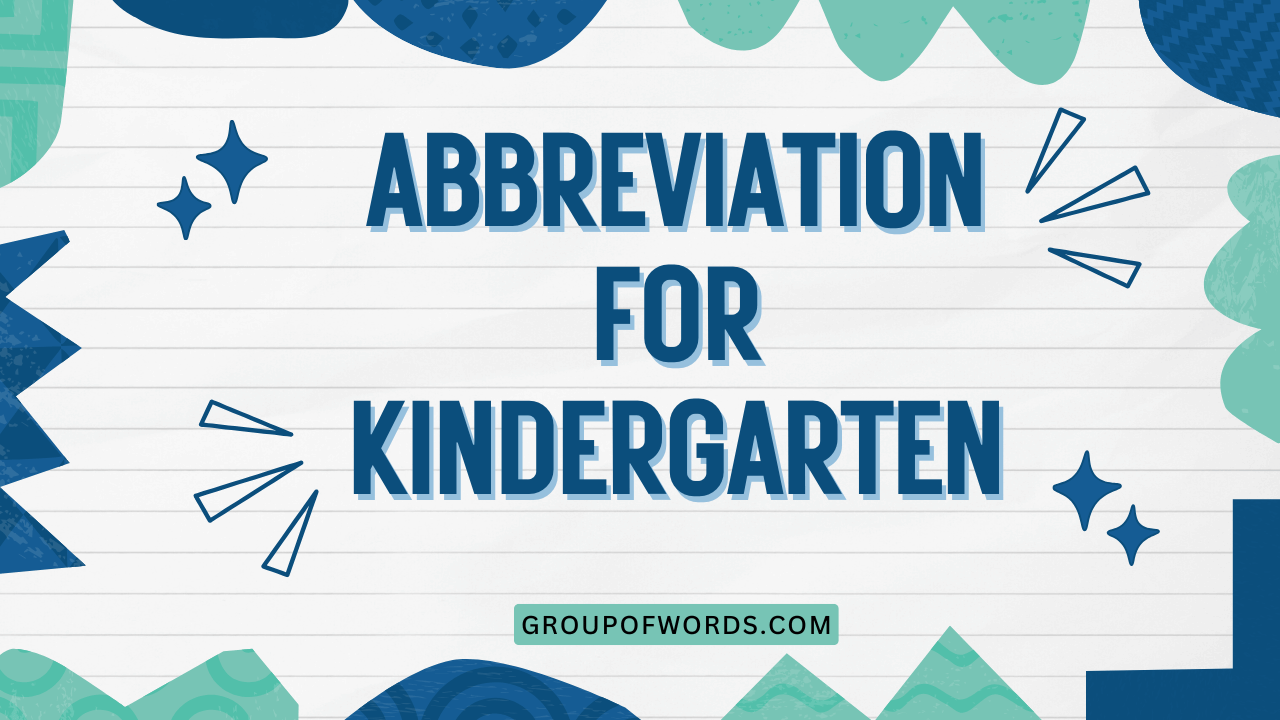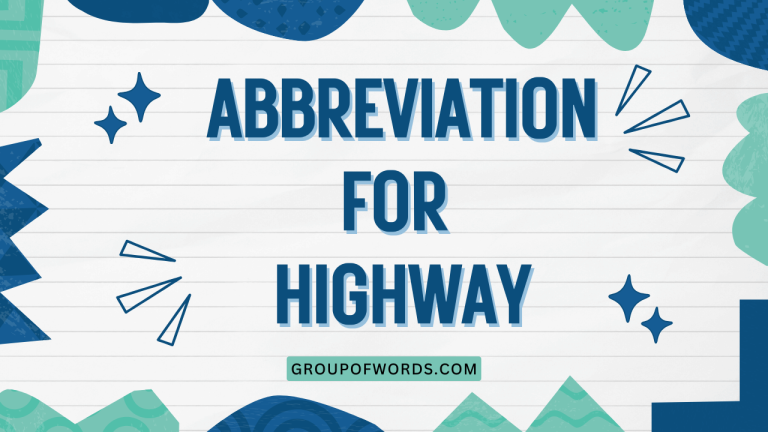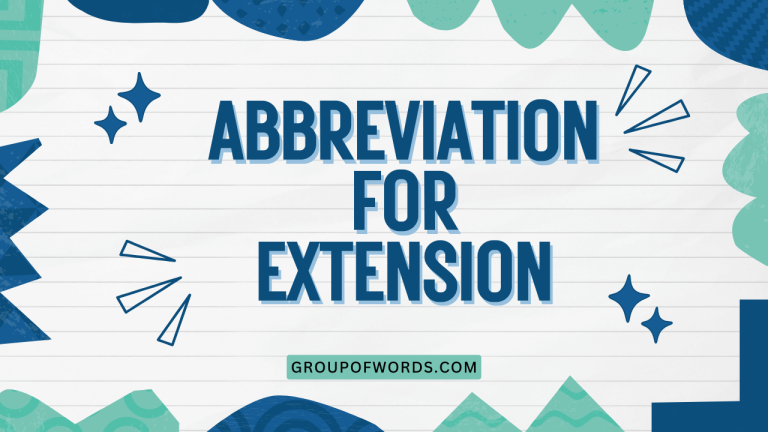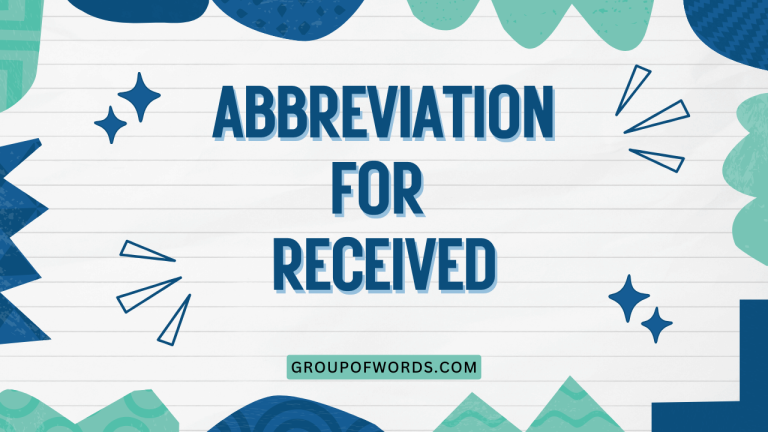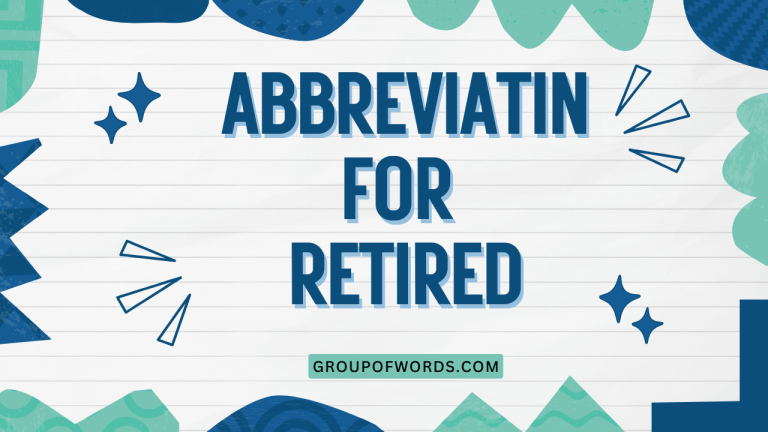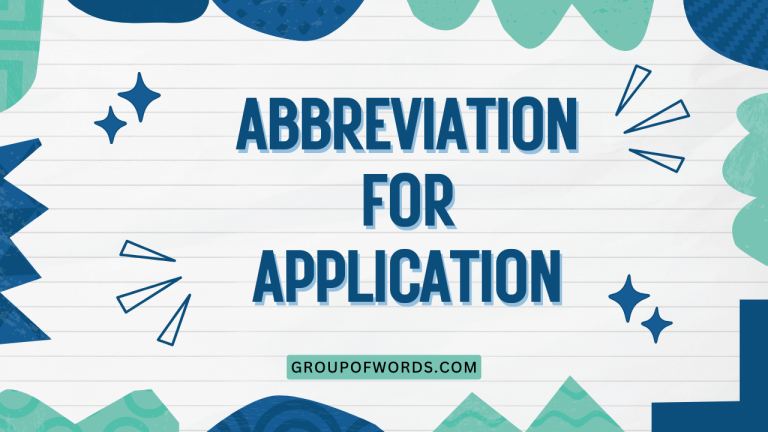Abbreviation for Kindergarten: A Comprehensive Guide
Understanding the correct abbreviation for “kindergarten” is essential for clear and concise communication, especially in educational contexts. Whether you’re a teacher, parent, or student, knowing the proper abbreviation can save time and space in writing.
This article provides a detailed exploration of the various abbreviations for “kindergarten,” their usage, and common mistakes to avoid. This guide benefits anyone who frequently encounters the term “kindergarten” in written form and seeks to use its abbreviations accurately.
Table of Contents
- Introduction
- Definition of Kindergarten
- Structural Breakdown of Abbreviations
- Types of Abbreviations for Kindergarten
- Examples of Kindergarten Abbreviations
- Usage Rules for Kindergarten Abbreviations
- Common Mistakes with Kindergarten Abbreviations
- Practice Exercises
- Advanced Topics
- Frequently Asked Questions
- Conclusion
Definition of Kindergarten
Kindergarten is a preschool educational program for children, typically between the ages of five and six, that serves as a transition from home or preschool to formal schooling. The word “kindergarten” comes from the German language, meaning “children’s garden.” Kindergarten focuses on developing social, emotional, and cognitive skills through play, exploration, and structured activities, preparing children for first grade and beyond.
In the context of education, kindergarten is considered the first year of formal schooling in many countries, including the United States, Canada, and Australia. It is designed to provide a nurturing and stimulating environment where children can learn essential skills such as literacy, numeracy, and social interaction.
The curriculum often includes activities like storytelling, art, music, and physical education, all aimed at fostering holistic development.
Structural Breakdown of Abbreviations
Abbreviations are shortened forms of words or phrases. They are created by omitting certain letters or using the initial letters of a word or phrase.
When forming abbreviations for “kindergarten,” several methods are commonly used, including:
- Truncation: Cutting off the end of the word (e.g., “Kind.”).
- Contraction: Removing letters from the middle of the word (less common for “kindergarten”).
- Initialism: Using the initial letters of a phrase (e.g., “KG”).
Understanding these methods helps in recognizing and using abbreviations correctly. The use of periods in abbreviations varies depending on the style guide (e.g., AP, MLA, Chicago).
Some abbreviations require periods (e.g., “Kind.”) while others do not (e.g., “KG”). Context and consistency are key when using abbreviations in writing.
The choice of abbreviation often depends on the specific context and the desired level of formality.
Types of Abbreviations for Kindergarten
Several abbreviations are commonly used for “kindergarten,” each with its own nuances and contexts. Here are the most common types:
1. Kind.
This is a truncated abbreviation, formed by cutting off the end of the word. It is relatively common and easily recognizable.
2. K
Using the initial letter of the word, this abbreviation is simple and concise. It is often used in tables or lists where space is limited.
3. KG
This is an initialism, using the first letters of “kindergarten.” It is widely recognized and used, especially in academic and administrative settings.
4. Kinder
A shortened version of the word, this abbreviation is less formal but still understandable in many contexts. It is often used in informal writing or speech.
5. K-garten
This is a less common but creative abbreviation that combines the initial letter with a shortened form of the word. It is sometimes used in informal settings or advertising.
Examples of Kindergarten Abbreviations
To illustrate the usage of different abbreviations for “kindergarten,” the following tables provide various examples in different contexts.
Table 1: Examples Using “Kind.”
The following table provides examples of how the abbreviation “Kind.” can be used in sentences and phrases. Note how it is often used in more formal writing or when referring to specific grade levels.
| Example | Context |
|---|---|
| My child is starting Kind. this year. | General statement about starting kindergarten. |
| The Kind. teacher is excellent. | Referring to a specific teacher. |
| Kind. registration begins next week. | Announcing registration information. |
| We have three Kind. classes this year. | Describing the number of kindergarten classes. |
| The Kind. curriculum focuses on early literacy. | Describing the curriculum. |
| She volunteered in the Kind. classroom. | Describing volunteer work. |
| Kind. students enjoy story time. | Describing an activity. |
| The Kind. program includes art and music. | Describing program components. |
| Kind. is an important year for development. | Highlighting the importance of kindergarten. |
| The Kind. field trip is to the zoo. | Announcing a field trip. |
| Our Kind. program emphasizes social skills. | Describing the program’s focus. |
| Parents are invited to the Kind. open house. | Inviting parents to an event. |
| The Kind. play was a great success. | Describing a school play. |
| Kind. students learn about the alphabet. | Describing learning activities. |
| The Kind. graduation ceremony is next month. | Announcing the graduation ceremony. |
| Kind. teachers use engaging activities. | Describing teaching methods. |
| The Kind. classroom is bright and colorful. | Describing the classroom environment. |
| Kind. is a fun and exciting year. | Expressing enthusiasm about kindergarten. |
| The Kind. class made paper plate animals. | Describing a class project. |
| Kind. students love to sing songs. | Describing children’s preferences. |
| The Kind. garden is flourishing. | Describing a school garden. |
| Kind. children are very creative. | Describing children’s creativity. |
| Our Kind. program is highly regarded. | Describing the program’s reputation. |
| Kind. students participate in show and tell. | Describing a classroom activity. |
| The Kind. teacher is very patient. | Describing the teacher’s qualities. |
Table 2: Examples Using “K”
The following table provides examples of how the abbreviation “K” can be used, especially in contexts where brevity is important, such as in tables, lists, or informal notes.
| Example | Context |
|---|---|
| Grade Levels: K-12 | Listing grade levels in a school. |
| K Reading List | Labeling a reading list for kindergarten. |
| K Supply List | Listing supplies needed for kindergarten. |
| K Enrollment | Referring to kindergarten enrollment. |
| K Teacher Meeting | Scheduling a meeting for kindergarten teachers. |
| K Curriculum Guide | Providing a curriculum guide for kindergarten. |
| K Art Projects | Listing art projects for kindergarten. |
| K Music Program | Describing the music program for kindergarten. |
| K Physical Education | Referring to physical education for kindergarten. |
| K Field Trips | Listing field trips for kindergarten. |
| K Parent Orientation | Announcing parent orientation for kindergarten. |
| K Registration Form | Providing a registration form for kindergarten. |
| K Classroom Rules | Listing classroom rules for kindergarten. |
| K Daily Schedule | Providing a daily schedule for kindergarten. |
| K Assessment Tests | Referring to assessment tests for kindergarten. |
| K Learning Objectives | Listing learning objectives for kindergarten. |
| K Development Goals | Listing development goals for kindergarten. |
| K Social Skills | Referring to social skills development in kindergarten. |
| K Literacy Program | Describing the literacy program for kindergarten. |
| K Numeracy Skills | Referring to numeracy skills development in kindergarten. |
| K Science Experiments | Listing science experiments for kindergarten. |
| K Math Games | Listing math games for kindergarten. |
| K Story Time | Referring to story time in kindergarten. |
| K Snack Time | Describing snack time in kindergarten. |
| K Recess | Referring to recess in kindergarten. |
Table 3: Examples Using “KG”
The following table provides examples of how the abbreviation “KG” is used, often in academic or administrative contexts, such as school directories, program descriptions, or official documents.
| Example | Context |
|---|---|
| KG Program Overview | Describing the kindergarten program. |
| KG Teacher Contact Information | Providing contact information for kindergarten teachers. |
| KG Curriculum Standards | Listing curriculum standards for kindergarten. |
| KG Assessment Report | Referring to an assessment report for kindergarten. |
| KG Registration Requirements | Listing registration requirements for kindergarten. |
| KG Orientation Schedule | Providing an orientation schedule for kindergarten. |
| KG Classroom Expectations | Listing classroom expectations for kindergarten. |
| KG Daily Activities | Describing daily activities in kindergarten. |
| KG Learning Resources | Listing learning resources for kindergarten. |
| KG Parent Handbook | Providing a parent handbook for kindergarten. |
| KG Field Trip Permission Form | Providing a permission form for kindergarten field trips. |
| KG Volunteer Opportunities | Listing volunteer opportunities in kindergarten. |
| KG Supply Donations | Requesting supply donations for kindergarten. |
| KG Special Events | Listing special events in kindergarten. |
| KG Holiday Celebrations | Describing holiday celebrations in kindergarten. |
| KG Student Achievements | Highlighting student achievements in kindergarten. |
| KG Academic Goals | Listing academic goals for kindergarten. |
| KG Social Development | Referring to social development in kindergarten. |
| KG Emotional Growth | Referring to emotional growth in kindergarten. |
| KG Creative Expression | Referring to creative expression in kindergarten. |
| KG Motor Skills | Referring to motor skills development in kindergarten. |
| KG Cognitive Skills | Referring to cognitive skills development in kindergarten. |
| KG Language Development | Referring to language development in kindergarten. |
| KG Math Concepts | Listing math concepts taught in kindergarten. |
| KG Science Topics | Listing science topics taught in kindergarten. |
Table 4: Examples Using “Kinder”
The following table provides examples of how the abbreviation “Kinder” is used, typically in more informal or conversational contexts. It is less formal than “Kind.” or “KG” but still conveys the meaning clearly.
| Example | Context |
|---|---|
| My kinder kid loves to draw. | Describing a child who is in kindergarten. |
| The kinder class is going to the park. | Referring to the kindergarten class. |
| Kinder registration is now open. | Announcing registration for kindergarten. |
| We have a kinder party next week. | Referring to a kindergarten party. |
| The kinder teacher is very enthusiastic. | Describing the kindergarten teacher. |
| Kinder students are learning about shapes. | Describing what kindergarten students are learning. |
| The kinder program is very engaging. | Describing the kindergarten program. |
| Our kinder garden is beautiful. | Referring to the school’s kindergarten garden. |
| Kinder kids love to sing songs. | Describing what kindergarten children enjoy. |
| The kinder classroom is very colorful. | Describing the kindergarten classroom. |
| Kinder activities include arts and crafts. | Listing activities in kindergarten. |
| Our kinder curriculum is well-rounded. | Describing the kindergarten curriculum. |
| Kinder is a great start to school. | Expressing a positive view of kindergarten. |
| The kinder field trip is to the farm. | Announcing a kindergarten field trip. |
| Kinder students made paper plate animals. | Describing a kindergarten class project. |
| The kinder graduation is this Friday. | Announcing the kindergarten graduation. |
| Kinder kids are very creative. | Describing the creativity of kindergarten children. |
| Our kinder program emphasizes play-based learning. | Describing the program’s focus. |
| Kinder students participate in show and tell. | Describing a classroom activity. |
| The kinder teacher is very patient. | Describing the teacher’s qualities. |
| Kindergarten is a fun year for kids. | Highlighting that kindergarten is fun. |
| Kinder students love to play outside. | Describing what kindergarten students love to do. |
| Our kinder students are very happy. | Describing the students’ happiness. |
| Kindergarten is the first step in education. | Highlighting the importance of kindergarten. |
| The kinder classroom is a positive environment. | Describing the classroom environment. |
Usage Rules for Kindergarten Abbreviations
Using abbreviations correctly involves understanding specific rules and guidelines. Here are some key rules for using abbreviations for “kindergarten”:
- Consistency: Choose one abbreviation and use it consistently throughout your document or communication.
- Context: Consider the context and audience. Formal writing may require a more formal abbreviation (e.g., “Kind.” or “KG”), while informal writing may allow for a simpler abbreviation (e.g., “K” or “Kinder”).
- Periods: Follow a consistent style guide regarding the use of periods. If using “Kind.”, include the period. If using “KG” or “K”, periods are generally not used.
- Clarity: Ensure the abbreviation is easily understood by your audience. If there is a risk of confusion, it is best to spell out the full word.
- Capitalization: Capitalize the abbreviation if the full word would be capitalized (e.g., at the beginning of a sentence).
It’s also important to note that some style guides may have specific rules for abbreviations. Always consult the relevant style guide if you are writing for a specific publication or organization.
While “Kinder” is commonly understood, it’s less formal and may not be appropriate in all contexts. When in doubt, spell out the word “kindergarten” to ensure clarity.
Common Mistakes with Kindergarten Abbreviations
Several common mistakes occur when using abbreviations for “kindergarten.” Being aware of these mistakes can help you avoid errors and communicate more effectively.
Table 5: Common Mistakes and Corrections
This table highlights common errors made when abbreviating “kindergarten” and provides the correct alternatives. It emphasizes the importance of consistency and context in abbreviation usage.
| Incorrect | Correct | Explanation |
|---|---|---|
| Kndg | Kind. or KG | “Kndg” is not a standard abbreviation. |
| KG. | KG | Periods are generally not used with “KG.” |
| k | K | Abbreviations should be capitalized when appropriate. |
| Kinder. | Kinder | “Kinder” is typically not followed by a period. |
| kind | Kind. | “kind” is not an abbreviation; use “Kind.” |
| Using “K” in formal reports. | Using “KG” or “Kind.” in formal reports. | “K” is too informal for formal documents. |
| Mixing “Kind.” and “KG” in the same document. | Using either “Kind.” or “KG” consistently. | Maintain consistency throughout the document. |
| Using “Kinder” in official correspondence. | Using “Kind.” or “KG” in official correspondence. | “Kinder” is less formal for official communication. |
| Ignoring capitalization rules. | Capitalizing abbreviations at the beginning of sentences. | Follow standard capitalization rules. |
| Using an unfamiliar abbreviation. | Spelling out “kindergarten” for clarity. | Ensure the abbreviation is easily understood. |
Practice Exercises
These practice exercises will help you reinforce your understanding of kindergarten abbreviations. Each exercise focuses on different aspects of abbreviation usage.
Exercise 1: Identifying Correct Abbreviations
Instructions: Choose the correct abbreviation for “kindergarten” in each sentence.
| Question | Options | Answer |
|---|---|---|
| 1. My daughter is starting ______ this year. | a) Kndg b) Kind. c) Kinder. | b) Kind. |
| 2. The ______ teacher is very experienced. | a) K b) KG. c) Kinder | c) Kinder |
| 3. ______ registration begins next week. | a) KG b) Kinder. c) Kndg | a) KG |
| 4. We have three ______ classes this year. | a) Kind. b) K c) Kinder. | a) Kind. |
| 5. The ______ curriculum is very engaging. | a) K b) KG c) Kndg | b) KG |
| 6. She volunteers in the ______ classroom. | a) Kinder b) Kind. c) k | b) Kind. |
| 7. ______ students enjoy story time. | a) K b) Kinder c) Kndg | b) Kinder |
| 8. The ______ program includes music and art. | a) KG b) Kndg c) Kinder. | a) KG |
| 9. ______ is an important year for learning. | a) K b) Kind. c) kndg | b) Kind. |
| 10. The ______ field trip is to the zoo. | a) K b) Kinder c) KG | b) Kinder |
Exercise 2: Correcting Incorrect Abbreviations
Instructions: Identify and correct the incorrect abbreviations in the following sentences.
| Question | Corrected Answer |
|---|---|
| 1. The k teacher is very patient. | The K teacher is very patient. |
| 2. KG. students are very creative. | KG students are very creative. |
| 3. My child is in kndg this year. | My child is in Kind. this year. |
| 4. The kinder. class is going on a trip. | The Kinder class is going on a trip. |
| 5. Registration for kg begins next week. | Registration for KG begins next week. |
| 6. She teaches the kind class. | She teaches the Kind. class. |
| 7. Our kinder program is highly rated. | Our Kinder program is highly rated. |
| 8. The KG. curriculum is well-rounded. | The KG curriculum is well-rounded. |
| 9. Knder students love to play. | Kinder students love to play. |
| 10. The kinder. kids are very excited. | The Kinder kids are very excited. |
Exercise 3: Choosing the Appropriate Abbreviation
Instructions: Choose the most appropriate abbreviation for the given context.
| Context | Options | Answer |
|---|---|---|
| 1. A formal school report. | a) K b) Kinder c) Kind. | c) Kind. |
| 2. A casual email to a friend. | a) KG b) Kind. c) Kinder | c) Kinder |
| 3. A list of grade levels in a school. | a) Kind. b) KG c) K | c) K |
| 4. An official school announcement. | a) Kinder b) K c) KG | c) KG |
| 5. A handwritten note. | a) Kind. b) K c) KG | b) K |
| 6. School policy document. | a) Kinder b) K c) KG | c) KG |
| 7. A teacher’s informal notes. | a) Kinder b) Kind. c) KG | a) Kinder |
| 8. A school brochure. | a) K b) Kind. c) KG | c) KG |
| 9. Short social media posts. | a) Kind. b) KG c) K | c) K |
| 10. Academic research paper. | a) K b) Kinder c) Kind. | c) Kind. |
Advanced Topics
For advanced learners, understanding the nuances of abbreviations and their usage in various contexts can be further explored. Here are some advanced topics:
- Historical Evolution of Abbreviations: Research how abbreviations for “kindergarten” have changed over time and across different regions.
- Cross-Cultural Usage: Investigate how different languages and cultures abbreviate the concept of early childhood education.
- Style Guide Variations: Compare and contrast the rules for abbreviating “kindergarten” in different style guides (e.g., AP, MLA, Chicago).
- Impact of Digital Communication: Analyze how digital communication and social media have influenced the use of abbreviations in educational contexts.
- Linguistic Analysis: Conduct a linguistic analysis of the phonological and morphological processes involved in creating abbreviations for “kindergarten.”
Exploring these advanced topics can provide a deeper understanding of the complexities and nuances of language use in educational settings. It also allows for a more critical and informed approach to writing and communication.
Frequently Asked Questions
Here are some frequently asked questions about the abbreviation for “kindergarten”:
- What is the most common abbreviation for “kindergarten”?
The most common abbreviations are “Kind.”, “KG,” and “K.” The choice depends on the context and level of formality. “KG” is often used in administrative and academic settings, “Kind.” is used in more formal writing, and “K” is used where brevity is needed.
- Is it correct to use “K” as an abbreviation for “kindergarten”?
Yes, “K” is a correct and widely used abbreviation, especially in tables, lists, and informal contexts where space is limited. It is simple and easily understood.
- Should I use a period after “KG”?
No, a period is generally not used after “KG.” It is an initialism, and initialisms typically do not require periods.
- Is “Kinder” an acceptable abbreviation?
“Kinder” is an acceptable abbreviation in informal contexts. It is less formal than “Kind.” or “KG” but still conveys the meaning effectively. However, it may not be appropriate for formal or official documents.
- How do I choose the right abbreviation for “kindergarten”?
Consider the context, audience, and level of formality. For formal writing, use “Kind.” or “KG.” For informal writing or situations where brevity is needed, use “K” or “Kinder.” Consistency is key, so choose one abbreviation and stick with it throughout your document.
- Are there any abbreviations for “kindergarten” that I should avoid?
Avoid using non-standard or unclear abbreviations like “Kndg.” Always use widely recognized abbreviations to ensure clarity and avoid confusion.
- What if I am unsure which abbreviation to use?
When in doubt, spell out the full word “kindergarten.” This ensures clarity and avoids any potential misunderstandings, especially in formal or official communications.
- Do different style guides have different rules for abbreviating “kindergarten”?
Yes, different style guides (e.g., AP, MLA, Chicago) may have slightly different rules for abbreviations. Consult the relevant style guide if you are writing for a specific publication or organization to ensure consistency and adherence to their guidelines.
Conclusion
Understanding the various abbreviations for “kindergarten” is crucial for effective communication in educational and administrative contexts. By learning the different types of abbreviations, their usage rules, and common mistakes to avoid, you can ensure clarity and accuracy in your writing.
Remember to consider the context, audience, and level of formality when choosing an abbreviation.
Consistency is key, so select one abbreviation and use it throughout your document. When in doubt, spelling out the full word “kindergarten” is always a safe option.
By following these guidelines, you can confidently and correctly use abbreviations for “kindergarten” in any situation, enhancing your writing and communication skills.
